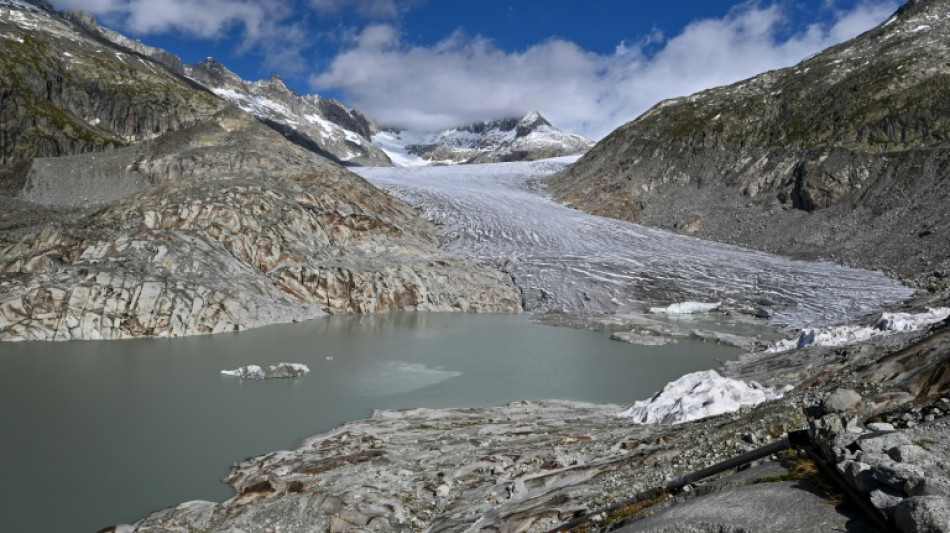
-
 'Not the end': Small US firms wary but hopeful on tariff upheaval
'Not the end': Small US firms wary but hopeful on tariff upheaval
-
US freestyle skier Ferreira wins Olympic halfpipe gold

-
 Svitolina edges Gauff to set up Pegula final in Dubai
Svitolina edges Gauff to set up Pegula final in Dubai
-
'Proud' Alcaraz digs deep to topple Rublev and reach Qatar final

-
 UK govt considers removing ex-prince Andrew from line of succession
UK govt considers removing ex-prince Andrew from line of succession
-
New study probes why chronic pain lasts longer in women

-
 Trump vows 10% global tariff after stinging court rebuke
Trump vows 10% global tariff after stinging court rebuke
-
Aston Martin in disarray as Leclerc tops F1 testing timesheets

-
 Venus Williams accepts Indian Wells wild card
Venus Williams accepts Indian Wells wild card
-
Anxious Venezuelans seek clarity on new amnesty law

-
 Last-gasp Canada edge Finland to reach Olympic men's ice hockey final
Last-gasp Canada edge Finland to reach Olympic men's ice hockey final
-
Scotland captain Tuipulotu grateful for Wales boss Tandy's influence

-
 Zelensky says no 'family day' in rare personal interview to AFP
Zelensky says no 'family day' in rare personal interview to AFP
-
Zelensky tells AFP that Ukraine is not losing the war

-
 Sweden to play Switzerland in Olympic women's curling final
Sweden to play Switzerland in Olympic women's curling final
-
Counting the cost: Minnesota reels after anti-migrant 'occupation'

-
 UK police probe Andrew's protection as royals reel from ex-prince's arrest
UK police probe Andrew's protection as royals reel from ex-prince's arrest
-
Doris says Ireland must pile pressure on England rising star Pollock

-
 US military assets in the Middle East
US military assets in the Middle East
-
Neymar hints at possible retirement after World Cup

-
 Stocks rise after court ruling against US tariffs
Stocks rise after court ruling against US tariffs
-
Australia end dismal T20 World Cup by thrashing Oman

-
 Olympics chief says Milan-Cortina has set new path for Games
Olympics chief says Milan-Cortina has set new path for Games
-
Russian SVR spy agency took over Wagner 'influence' ops in Africa: report

-
 Pegula fights back to sink Anisimova and reach Dubai final
Pegula fights back to sink Anisimova and reach Dubai final
-
Trump administration denounces 'terrorism' in France after activist's killing

-
 Colombia's Medellin builds mega-prison inspired by El Salvador's CECOT
Colombia's Medellin builds mega-prison inspired by El Salvador's CECOT
-
German broadcaster recalls correspondent over AI-generated images

-
 US Supreme Court strikes down swath of Trump global tariffs
US Supreme Court strikes down swath of Trump global tariffs
-
England's Itoje says managing 'emotional turmoil' key to 100 cap landmark

-
 Trump says weighing strike on Iran as Tehran says draft deal coming soon
Trump says weighing strike on Iran as Tehran says draft deal coming soon
-
Tudor is '100 percent' certain of saving Spurs from relegation

-
 Azam dropped for scoring too slowly, says Pakistan coach Hesson
Azam dropped for scoring too slowly, says Pakistan coach Hesson
-
Stocks volatile after soft US growth data, court ruling against tariffs

-
 Italy bring back Capuozzo for France Six Nations trip
Italy bring back Capuozzo for France Six Nations trip
-
From Malinin's collapse to Liu's triumph: Top Olympic figure skating moments

-
 Arteta urges Arsenal to 'write own destiny' after title wobble
Arteta urges Arsenal to 'write own destiny' after title wobble
-
Ukraine Paralympics team to boycott opening ceremony over Russian flag decision

-
 Wales captain Lake wants fans to bring 'noise' against Scotland
Wales captain Lake wants fans to bring 'noise' against Scotland
-
Skier Vonn's Italian hospital a hotbed of men, sister says

-
 India target S.Africa top order, Abhishek to come good: bowling coach
India target S.Africa top order, Abhishek to come good: bowling coach
-
Carrick praises Man Utd 'diversity' after Ratcliffe's immigrant rant

-
 I never thought it would be hit, says 'Scream' creator 30 years later
I never thought it would be hit, says 'Scream' creator 30 years later
-
AI summit statement delayed to 'maximise' signatories: India

-
 Barcelona's Sagrada Familia basilica hits peak height
Barcelona's Sagrada Familia basilica hits peak height
-
Milan sprints to second straight UAE stage win as Tiberi keeps lead

-
 US GDP growth misses expectations as Trump blames shutdown
US GDP growth misses expectations as Trump blames shutdown
-
Benfica investigate video of fans' monkey gestures

-
 French minister pledges tight security at rally for killed activist
French minister pledges tight security at rally for killed activist
-
Guardiola 'couldn't care less' about Arsenal stumble in title race


Global glacier melt is accelerating, scientists say
Ice loss from the world's glaciers has accelerated over the past decade, scientists said on Wednesday, warning that melting may be faster than previously expected in the coming years and drive sea levels higher.
The world's glaciers, which are important climate regulators and hold freshwater resources for billions, are rapidly melting as the world warms.
In a first-of-its-kind global assessment, an international team of researchers found a sharp increase in melting over the past decade, with around 36 percent more ice lost in the 2012 to 2023 period than in the years from 2000 to 2011.
On average some 273 billion tonnes of ice are being lost per year -- equivalent to the world population's water consumption for 30 years, they said.
The findings are "shocking" if not altogether surprising as global temperatures rise with humanity's greenhouse gas emissions, said Michael Zemp, a professor at the University of Zurich, who was a co-author of the assessment published in the journal Nature.
Overall, researchers found that the world's glaciers have lost around five percent of their volume since the turn of the century, with wide regional differences ranging from a two-percent loss in Antarctica to up to 40 percent in the European Alps.
Zemp said that regions with smaller glaciers are losing them faster, and many "will not survive the present century".
The research -- coordinated by the World Glacier Monitoring Service (WGMS), The University of Edinburgh and research group Earthwave -- was an effort to bring together field and satellite measurements to create a "reference estimate" for tracking ice loss.
Zemp, who leads the WGMS, said the team's observations and recent modelling studies suggest that glacier melt this century will be faster than projected in the most recent assessment by United Nations IPCC climate experts.
"Hence, we are facing higher sea-level rise until the end of this century than expected before," he told AFP, adding that glacier loss would also impact fresh water supplies, particularly in central Asia and the central Andes.
Glaciers are the second-largest contributor to global sea-level rise -- after the rise caused by the expansion of seawater as it warms.
The nearly two centimetres (0.8 inches) of sea level rise attributed to glacier melt since 2000 means almost four million more people on the world's coasts made vulnerable to flooding, scientists have estimated.
- 'Survival strategy' -
So far smaller glaciers are the main contributors to sea level rise, but Martin Siegert, a Professor at the University of Exeter who was not involved in the study, said the research was "concerning".
That is because it predicts further glacier losses and could indicate how Antarctica and Greenland's vast ice sheets react to global warming.
"Ice sheets are now losing mass at increasing rates -- six times more than 30 years ago -- and when they change, we stop talking centimetres and start talking metres," he said.
Glaciers have been a key bellwether for human-caused climate change for decades, with WGMS data going back more than a century.
In the 20th century, assessments were based on field measurements from some 500 glaciers -- involving scientists digging a hole on the top to record the amount of fresh snow that year and then assessing ice amounts lost on the "tongue" where the melting ice flows.
More recently, satellites have allowed scientists to better track changes across the world's 275,000 glaciers -- using cameras, radar, lasers and methods to assess the Earth's mass.
In January, the United Nations said saving the world's glaciers was an important "survival strategy" for the planet.
To do that, "you have to reduce the greenhouse gas emissions, it is as simple and as complicated as that," said Zemp.
"Every tenth of a degree warming that we avoid saves us money, saves us lives, saves us problems."
D.Kaufman--AMWN



